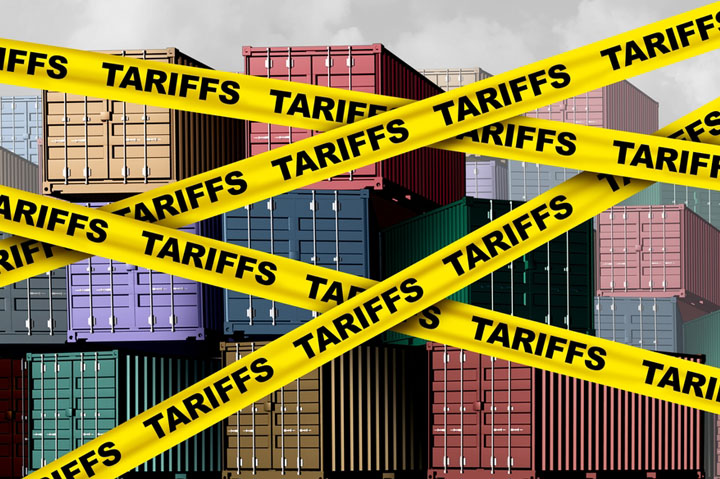News September 02, 2025
Federal Appeals Court Rules Trump ‘Reciprocal’ Tariffs Illegal
However, the court decision leaves current tariffs in place until Oct. 14, giving the president time to appeal the ruling up to the Supreme Court.
Key Takeaways
• A federal appeals court ruled that President Trump exceeded his authority under the International Emergency Economic Powers Act by imposing “reciprocal” tariffs, stating that the law does not grant unilateral power to enact such trade measures.
• The decision stems from consolidated lawsuits brought by small businesses and 12 states, arguing that tariff authority lies with Congress. The court’s 7-4 ruling upholds a prior trade court decision blocking the tariffs’ implementation.
• The current tariffs will remain in effect until October 14, the appeals court-imposed deadline for the Trump administration to appeal to the U.S. Supreme Court.
A federal appeals court ruled Friday that President Trump had overstepped his authority when enacting many of his sweeping 2025 tariffs.
The 7-4 decision from the U.S. Court of Appeals for the Federal Circuit strikes down the “reciprocal” tariffs Trump has implemented so far this year, but the levies will remain in place through Oct. 14 to allow for the administration to appeal to the U.S. Supreme Court.
The case itself, known as V.O.S. Selections, Inc. v. Trump, is the consolidated version of two separate lawsuits: one brought by five small U.S. businesses – represented by the Libertarian public interest law firm Liberty Justice Center – and another brought by 12 states. It was first heard back in May by the Court of International Trade, a federal trade court that also ruled to block the implementation of Trump’s tariffs. The Trump administration appealed almost immediately, which prompted the tariffs to remain in place while proceedings occurred.
Trump has largely used the International Emergency Economic Powers Act of 1977 (IEEPA) as the legal basis for bringing down his barrage of reciprocal tariffs, which have affected nearly every country in the world. At their height, tariffs on China were as high as 145%; while they’ve settled down, nations like India – which many promo firms had started to use as an alternative to China for international manufacturing, particularly for apparel – still face tariffs as high as 50%.
The Liberty Justice Center argues that IEEPA doesn’t, in fact, grant Trump the power to implement either the new baseline 10% import tariff or the reciprocal tariffs. The power to impose tariffs has historically exclusively lain with Congress and the legislative branch, and IEEPA doesn’t mention “tariffs” or “taxes” at all.
The law does provide the president the authority to take economic action, including regulating trade, when a national emergency is declared in response to an “unusual and extraordinary threat” as it relates to national security, foreign policy or the state of the U.S. economy.
The Trump administration maintains that the U.S. trade deficit with countries like China constitutes such a national emergency, as does the trafficking of opioids into the U.S. from Mexico, Canada and China.
“Congress, in enacting IEEPA, did not give the President wide-ranging authority to impose tariffs of the nature of the Trafficking and Reciprocal Tariffs simply by the use of the term ‘regulate . . . importation,’” the appeals court wrote in its decision.
“For the second time in this case, a federal court has held that the President’s so-called ‘Liberation Day’ tariffs are unlawful,” Jeffrey Schwab, senior counsel and director of litigation at the Liberty Justice Center, said in a statement. “The President cannot lawfully impose tariffs on his own; and IEEPA does not give him unlimited unilateral tariff authority.”
“Congress, in exacting IEEPA, did not give the President wide-ranging authority to impose tariffs.” The U.S. Court of Appeals for the Federal Circuit, V.O.S. Selections v. Trump
The Trump administration has already indicated that it plans to appeal the decision to the U.S. Supreme Court before the appeals court deadline of Oct. 14, according to The New York Times. The tariffs will stay in place until then, though it’s unclear whether they’ll remain active after that deadline but during expected Supreme Court proceedings, which could take months.
Regardless of the outcome of the case, it won’t affect the heightened aluminum or steel import tariffs Trump has also put in place so far this year. Those levies were enacted under a separate national security authority and aren’t in question as of this writing, even by any of the other lawsuits brought against the Trump administration’s tariff situation. At least one other lawsuit specifically focuses on the de minimis exemption, a tariff loophole for low-value imports that officially ended on Friday.

